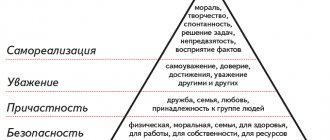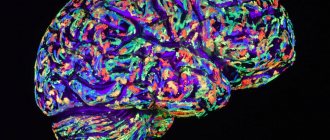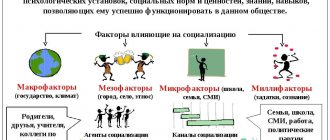Concept
The term includes a set of desires that arise in the process of life in society and during interaction with others. It should not be confused with primary needs - food, drink, safety, rest, comfort.
In relation to the primary ones, social needs are secondary. An individual cannot exist without food or sleep, because this will lead to his death. The absence of secondary needs does not entail such tragic consequences, but it can have a negative impact on psychological health and become an obstacle to socialization.
In addition, dissatisfaction leads to a decrease in living standards. There are often cases when this, in turn, makes it difficult to complete the primary ones. For example, an unfulfilled desire at work leads to a loss of confidence in the future, and therefore security.
The nature of the social needs of the individual
In a broad sense, social need is explained as a form of contact of a living being with the surrounding reality. For people, these are aspirations that are characteristic of all individuals, as representatives of the human group.
An individual’s belonging to society gives rise to emotionally charged drives. When they are implemented, personal growth occurs. Needs provide motivation for activity and shape behavior, and as they are satisfied, they are replaced, and new desires come into activity.
Biological requirements are expressed in the need to maintain the functioning of the body. In humans, as in animals, realization occurs in the form of an unconscious instinct. However, the question of the “foundation” inherent in this concept remains controversial in the scientific world.
Types of human social needs
Fulfilling needs helps not only to develop, but also to improve the standard of living. But understanding the huge variety is not as easy as it seems at first glance. Conventionally, basic drives are divided into 3 categories. And my consultation will help you determine your own desires and make every day happy.
For myself
These are aspirations that help to achieve the desired degree of development and status in society. These include:
- Self-identification. The need to be like a specific person or image. This is how the child correlates his “I” with the parent of his gender and thereby begins to recognize himself as a boy or a girl. This becomes active at different stages: when studying at school, university, at work, when starting a family.
- Self-affirmation. An individual wants to realize his full potential and take a worthy position in society. He achieves the respect of others and establishes himself as a professional in a certain field.
This also includes the need to have power and gain universal recognition. A striking example of such a social human need is Benvenuto Cellini. This undoubtedly talented sculptor lived a long life, also becoming famous as a jeweler, warrior and writer. In his last years, he released an autobiography, where, in an effort to gain even more fame, he attributed to himself actions that he had never committed.
Psychologist Daria Milai
Make an appointment
For others
This category differs from the previous type in the absence of egoistic manifestations. A striking example is altruism. This is free help to others, even if it comes to the detriment of one’s own interests and benefits. A person cares about people as much as he cares about himself, and sometimes even better.
Such an individual wants to selflessly serve humanity, is ready for self-sacrifice, and strives to protect the weak.
In addition, this includes selfless friendship, built not on benefiting from communication, but on the mutual sympathy of friends. And, of course, love. This is a special feeling that takes place in everyone. Often it is synonymous with the meaning of existence, the personification of happiness. Its role in life cannot be overestimated.
This is the reason why families are formed and children are born. And vice versa, the basis for psychological and often physical complications is if the love is non-reciprocal, unhappy or unsatisfied.
This is an effective motivation for activity and development, because it inspires new achievements. Satisfying a person’s social need for love for parents, child, existence, work, city is the basis for the formation of a harmonious and full-fledged personality.
Together with others
This is a set of needs that unite the actions of individuals in solving social problems that have become the most pressing at the moment. This includes the need for security, universal peace, and freedom.
The most revealing example is the invasion of fascist troops into the territory of the USSR. All people, regardless of gender, religion and place of residence, united for a common goal - to repel enemies.
Independence, justice, humanity and adherence to the rules of ethics and ethics - these are the points that everyone wants not only for themselves, but also for loved ones and all of humanity.
Article 3. State needs and municipal needs. Commentary on Article 3
The article establishes the meaning of the concepts “state needs”, “federal needs”, “needs of the constituent entities of the Russian Federation” and “municipal needs”. 1. State needs are understood to mean the needs of the Russian Federation for goods, works, services necessary for the implementation of the functions of the Russian Federation (in including for the implementation of federal target programs), for the fulfillment of the international obligations of the Russian Federation, including for the implementation of interstate target programs in which the Russian Federation participates (hereinafter also referred to as federal needs), or the needs of the constituent entities of the Russian Federation for goods, works, services necessary to carry out the functions of the constituent entities of the Russian Federation, including the implementation of regional target programs (hereinafter also referred to as the needs of the constituent entities of the Russian Federation). Thus, the concept of “state needs” combines the concepts of “federal needs” and “needs of the constituent entities of the Russian Federation”. In accordance with paragraph 3 of Art. 5 “State forecasting and planning of socio-economic development of the Russian Federation for the short term” of the Federal Law “On state forecasting and programs for socio-economic development of the Russian Federation” The Government of the Russian Federation, simultaneously with the presentation of the draft federal budget, submits to the State Duma the following documents and materials: the results of social economic development of the Russian Federation over the past period of the current year; forecast of socio-economic development for the coming year; draft consolidated financial balance for the territory of the Russian Federation; a list of the main socio-economic problems (tasks) to be addressed by the policy of the Government of the Russian Federation in the coming year; a list of federal target programs planned for financing from the federal budget for the coming year; list and volumes of supplies of products for federal government needs according to an enlarged nomenclature; planned plans for the development of the public sector of the economy. The Government of the Russian Federation, if necessary, submits draft federal laws that provide for measures to implement the tasks of socio-economic development of the Russian Federation in the coming year. The list of federal target programs indicates: a brief description of each of the federal target programs adopted for implementation, including an indication of the goals, main stages and deadlines for their implementation; results of the implementation of the main stages for rolling federal target programs; the required amounts of financing for each of the federal target programs adopted for implementation in general and by year, indicating the sources of financing; volumes of financing of federal target programs from the federal budget in the coming year; state customers of programs (see clause 4 of article 5 of the Federal Law “On State Forecasting and Programs for Social and Economic Development of the Russian Federation”). Federal Law No. 115-FZ of July 20, 1995 “On State Forecasting and Programs for Social and Economic Development of the Russian Federation” (as amended by Federal Law No. 159-FZ of July 9, 1999) defines the goals and content of the system of state forecasts of social -economic development of the Russian Federation and programs for the socio-economic development of the Russian Federation, as well as the general procedure for developing these forecasts and programs (see the preamble of the Federal Law “On State Forecasting and Programs for the Socio-Economic Development of the Russian Federation”). State forecasting of socio-economic development of the Russian Federation is a system of scientifically based ideas about the directions of socio-economic development of the Russian Federation, based on the laws of market management. The results of state forecasting of the socio-economic development of the Russian Federation are used when the legislative and executive authorities of the Russian Federation make specific decisions in the field of socio-economic policy of the state. The concept of socio-economic development of the Russian Federation is a system of ideas about the strategic goals and priorities of the state’s socio-economic policy, the most important directions and means of achieving these goals. The program for the socio-economic development of the Russian Federation is a comprehensive system of targets for the socio-economic development of the Russian Federation and effective ways and means of achieving these targets planned by the state (see Article 1 of the Federal Law “On State Forecasting and Programs for the Socio-Economic Development of the Russian Federation”) . The procedure for the development and implementation of federal target programs and interstate target programs, in the implementation of which the Russian Federation participates, was approved by Decree of the Government of the Russian Federation of June 26, 1995 N 594 (as amended by Decrees of the Government of the Russian Federation of 07/01/1996 N 778, of 09/13/1996 N 1101, from 07/01/1997 N 778, from 07/08/1997 N 844, from 07/21/1998 N 811, from 01/25/1999 N 90, from 04/22/2002 N 263, from 03/20/2003 N 165, from 12/25/200 4 N 842 ; further in the comments to the article - Order). Federal target programs and interstate target programs in the implementation of which the Russian Federation participates (hereinafter in the commentary to the article - target programs) represent a complex of research, development, production, socio-economic, organizational, economic and other measures that provide an effective solution to systemic problems in the field of state, economic, environmental, social and cultural development of the Russian Federation. Targeted programs are one of the most important means of implementing the state's structural policy, actively influencing its socio-economic development and should be focused on the implementation of large-scale, most important investment and scientific and technical projects for the state, aimed at solving systemic problems that fall within the competence of federal executive authorities. A target program may include several subprograms aimed at solving specific problems within the program. The division of the target program into subprograms is carried out based on the scale and complexity of the problems being solved, as well as the need for a rational organization of their solution (see paragraph 1 of the Procedure as amended by Decree of the Government of the Russian Federation of December 25, 2004 N 842). The development of the project and approval of the target program are carried out within the time frame in accordance with Appendix No. 1 to the Procedure and include the following main stages: development of a draft concept of the target program; making a decision on the development of a draft target program by the Government of the Russian Federation and approving the concept of the target program; development of a draft target program; approval of the draft target program; examination of the draft target program, including by independent experts; consideration of the draft target program at a meeting of the Government of the Russian Federation; finalization of the target program in accordance with the comments of the Government of the Russian Federation; approval of the target program by the Government of the Russian Federation (clause 2 of the Procedure as amended by Decree of the Government of the Russian Federation of December 25, 2004 N 842). The Russian Federation consists of republics, territories, regions, cities of federal significance, autonomous regions, autonomous districts - equal subjects of the Russian Federation (see Part 1 of Article 5 of the Constitution of the Russian Federation). A republic (state) has its own constitution and legislation. A region, region, city of federal significance, autonomous region, autonomous district has its own charter and legislation (see Part 2 of Article 5 of the Constitution of the Russian Federation). The Russian Federation includes the constituent entities of the Russian Federation (see Part 1 of Article 65 of the Constitution of the Russian Federation as amended by Decrees of the President of the Russian Federation of 01/09/1996 N 20, of 02/10/1996 N 173, of 06/09/2001 N 679, of 07/25. 2003 N 841): Republic of Adygea (Adygea), Republic of Altai, Republic of Bashkortostan, Republic of Buryatia, Republic of Dagestan, Republic of Ingushetia, Kabardino-Balkarian Republic, Republic of Kalmykia, Karachay-Cherkess Republic, Republic of Karelia, Republic of Komi, Republic of Mari El, Republic Mordovia, the Republic of Sakha (Yakutia), the Republic of North Ossetia - Alania, the Republic of Tatarstan (Tatarstan), the Republic of Tyva, the Udmurt Republic, the Republic of Khakassia, the Chechen Republic, the Chuvash Republic - Chuvashia; Altai Territory, Krasnodar Territory, Krasnoyarsk Territory, Primorsky Territory, Stavropol Territory, Khabarovsk Territory; Amur region, Arkhangelsk region, Astrakhan region, Belgorod region, Bryansk region, Vladimir region, Volgograd region, Vologda region, Voronezh region, Ivanovo region, Irkutsk region, Kaliningrad region, Kaluga region, Kamchatka region, Kemerovo region, Kirov region, Kostroma region , Kurgan region, Kursk region, Leningrad region, Lipetsk region, Magadan region, Moscow region, Murmansk region, Nizhny Novgorod region, Novgorod region, Novosibirsk region, Omsk region, Orenburg region, Oryol region, Penza region, Perm region, Pskov region, Rostov region region, Ryazan region, Samara region, Saratov region, Sakhalin region, Sverdlovsk region, Smolensk region, Tambov region, Tver region, Tomsk region, Tula region, Tyumen region, Ulyanovsk region, Chelyabinsk region, Chita region, Yaroslavl region; Moscow, St. Petersburg - cities of federal significance; Jewish Autonomous Region; Aginsky Buryat Autonomous Okrug, Komi-Permyak Autonomous Okrug, Koryak Autonomous Okrug, Nenets Autonomous Okrug, Taimyr (Dolgano-Nenets) Autonomous Okrug, Ust-Ordynsky Buryat Autonomous Okrug, Khanty-Mansi Autonomous Okrug - Ugra, Chukotka Autonomous Okrug, Evenki Autonomous Okrug , Yamalo-Nenets Autonomous Okrug. Admission to the Russian Federation and the formation of a new subject within it are carried out in the manner established by federal constitutional law (see Part 2 of Article 65 of the Constitution of the Russian Federation). Federal constitutional law dated March 25, 2004 N 1-FKZ established that from December 1, 2005, a new subject of the Russian Federation - the Perm Territory - will be formed as a result of the unification of the Perm region and the Komi-Permyak Autonomous Okrug (see Art. 1), which cease existence as subjects of the Russian Federation from December 1, 2005 (see Article 4). 2. Municipal needs mean the needs of municipalities for goods, works, and services necessary to resolve issues of local importance and exercise certain state powers delegated to local governments by federal laws and (or) in accordance with the expenditure obligations of municipalities. ) laws of the constituent entities of the Russian Federation. The meanings of the concepts “municipal entity”, “local government bodies”, “representative bodies of local government”, “municipal district”, “urban district” are established in Art. 2 of the Federal Law of October 6, 2003 N 131-FZ “On the General Principles of Local Self-Government in the Russian Federation” (as amended by the Federal Laws of 06/19/2004 N 53-FZ and of 08/12/2004 N 99-FZ). Municipal district - several settlements or settlements and inter-settlement territories, united by a common territory, within the boundaries of which local self-government is exercised in order to resolve issues of local importance of an inter-settlement nature by the population directly and (or) through elected and other local government bodies that can exercise certain state powers, transferred to local governments by federal laws and laws of constituent entities of the Russian Federation. Urban district is an urban settlement that is not part of a municipal district and whose local government bodies exercise powers to resolve issues of local importance of the settlement and issues of local importance of the municipal district established by Federal Law N 131-FZ, and can also exercise certain state powers delegated to the bodies local self-government by federal laws and laws of constituent entities of the Russian Federation. Settlement - an urban or rural settlement. Urban settlement - a city or town with adjacent territory (an urban settlement may also contain rural settlements that are not rural settlements in accordance with Federal Law N 131-FZ and the laws of the constituent entities of the Russian Federation), in which local self-government is exercised by the population directly and (or ) through elected and other local government bodies. Rural settlement - one or more rural settlements united by a common territory (villages, villages, hamlets, kishlaks, auls and other rural settlements), in which local self-government is exercised by the population directly and (or) through elected and other local government bodies. Intersettlement territory is a territory located outside the boundaries of settlements. Municipal formation - an urban or rural settlement, municipal district, urban district or intracity territory of a city of federal significance. Local self-government in the Russian Federation is recognized and guaranteed by the Constitution of the Russian Federation as an independent activity of the population under its own responsibility to resolve issues of local importance directly or through local government bodies, based on the interests of the population, its historical and other local traditions. Local self-government as an expression of the power of the people is one of the foundations of the constitutional system of the Russian Federation (see Article 1 of the Federal Law “On the General Principles of the Organization of Local Self-Government in the Russian Federation”). Local government bodies are bodies elected directly by the population and (or) formed by the representative body of the municipality, vested with their own powers to resolve issues of local importance. Issues of local importance are issues of direct support for the life of the population of a municipal formation, classified as such by the charter of the municipal formation in accordance with the Constitution of the Russian Federation, the Federal Law “On the General Principles of the Organization of Local Self-Government in the Russian Federation,” and the laws of the constituent entities of the Russian Federation. The terms “municipal” and “local” and phrases with these terms are used in relation to local government bodies, enterprises, institutions and organizations, property and other objects, the purpose of which is related to the implementation of the functions of local government, as well as in other cases related to the implementation by the population of local government (see paragraph 2 of Article 2 of the Federal Law “On the General Principles of the Organization of Local Self-Government in the Russian Federation”). The representative body of a municipal formation may exercise its powers if at least two-thirds of the established number of deputies is elected. The representative body of the settlement consists of deputies elected in municipal elections. A representative body of a settlement is not formed if the number of residents of the settlement with voting rights is less than 100 people. In this case, the powers of the representative body are exercised by a gathering of citizens. The representative body of a municipal district may: consist of the heads of settlements that are part of the municipal district, and of deputies of the representative bodies of these settlements, elected by the representative bodies of the settlements from among their members in accordance with the same norm of representation, regardless of the population of the settlement; to be elected in municipal elections on the basis of universal, equal and direct suffrage by secret ballot. At the same time, the number of deputies elected from one settlement cannot exceed two-fifths of the established number of the representative body of the municipal district (see paragraphs 1 - 4 of Article 35 of the Federal Law “On the General Principles of the Organization of Local Self-Government in the Russian Federation”).
Classification of human social needs
There are many divisions of human aspirations. The most famous of them is A. Maslow’s pyramid. It has several levels from the simplest to the most advanced needs. The scientist argued that the realization of desires of a low category leads to the emergence of those that are one level higher.
Face-to-face consultation
What are the features and advantages of face-to-face consultation?
Find out more
Skype consultation
What are the features and benefits of Skype consultations?
Find out more
According to the theory, all personality drives are innate and are organized into a specific hierarchy according to priority. It looks like this:
- Physiological: food, drink, rest, sleep.
- Security: stability, orderliness, security, freedom from fear and anxiety, chaos.
- In a sense of necessity, manifestations of love: friendship, family, one’s own social circle.
- In the respect of others: fame, irreplaceability, recognition, self-esteem, reputation, position in society.
- In self-realization: profession depending on abilities and interests, development of skills.
However, Maslow foresaw exceptions to the rules. For some, the need for self-affirmation may be higher than realizing their potential and doing what they love. The list of social needs also includes primary and secondary.
Congenital
They are also called physiological. Without the implementation of such requests, a person simply cannot exist. These include hunger and thirst, the need to breathe clean and fresh air, get enough sleep regularly, and satisfy sexual desire.
This also includes security and confidence in the future, economic stability. All this is inherent in people at the genetic level.
Purchased
They are psychological in nature and appear only with increasing life experience. This is the desire to become successful, to occupy a high position in society, to gain universal recognition and respect, and to start a family. Secondary needs also have a classification:
- Social. The desire to communicate with people, demonstrate skills and knowledge in public life, and achieve a worthy place. All this develops depending on the individual’s ideas about the structure of society.
- Ideal. The desire for independent development: obtaining new information, studying reality, learning the meaning of life.
- Spiritual. They appear when an individual strives to make life experience richer, expand his horizons, develop his own creative abilities, and realize the beautiful. This makes you take an interest in world culture, work not for profit, but for your growth and desire to know yourself through work.
Despite the fact that social needs are considered secondary, they are more significant for people. For example, a student is very sleepy, but instead he is studying for an upcoming exam. Mom takes care of the baby, forgetting to eat.
There are many such situations that can be cited. After all, everyone strives to be active and useful in society, to establish positive interpersonal relationships, and to earn the respect and recognition of others.
When it is not possible to realize these drives, a feeling of uselessness and uselessness appears. This has a profound psychological effect on him.
Maslow's pyramid
The prominent American psychologist Abraham Maslow took an active part in the study of needs, demands and demands. The “Maslow pyramid” is very popular, representing a hierarchy of human needs from lowest to highest. The author believes that as the needs necessary for survival are satisfied, a person gradually develops needs of a higher order.
In its most simplified form, the pyramid can be divided into the following steps as it approaches its highest point. The primary one is the need for protection from hunger and cold. Next comes the desire to protect and protect yourself. When a person is fed and protected, the thought of social status arises. Once in a certain society, the subject achieves the respect and support of others. At the very top of the pyramid is the need for self-expression. Abraham Maslow said that there are an infinite number of needs, but they have one common feature: satisfying them all is unthinkable due to limited economic resources.
What is a person's social needs?
One of the priority needs is internal sensations. For example, the desire for freedom and independent position. The individual wants to break out of the usual framework, if he has one.
Hedonism is another desire that everyone has. Everyone loves to periodically be in a state of serenity, both material, spiritual and physical. But many deny this “wish”, although it is present on a subconscious level. And that's okay. After all, if at the moment there is no way to achieve comfort, then it is easier to convince yourself that it is not necessary.
What else is included
Everyone at least sometimes wants to be the center of attention to feel important. And the point here is not selfishness, but self-respect, increasing authority in one’s own eyes.
No matter how contradictory it may seem, everyone needs negativity. Aggression is a characteristic inherent in everyone. The manifestation of feelings leads to self-satisfaction, a feeling of rightness.
But not everything is so bad, and the need for goodness is also included in the list. Everyone had a desire to help a loved one for free, to perform a selfless act. After this there is a sense of nobility and caring.
Basic sociogenic need
- Activity. Attraction can be divided according to different characteristics: nature, intensity, results. But the fact that a person wants to work is a fact. A person can spend a day, a week or even a year playing computer games. But he will get tired of it, as well as the feeling of uselessness. Along with work, he satisfies the need for recognition, respect, and gaining power. The opposite situation is when, after completing a lot of work tasks, there is a need for rest, both physical and spiritual.
- Self-development. A complete person always wants to gain knowledge and skills. You can do this all your life, learn new things and improve.
- Communication skills. People need to establish and maintain trusting relationships that help them share their own experiences and emotions and receive feedback.
Classic interpretations
The word “need” implies an urgent need for something, and not necessarily food or clothing. A need is a need, and there are several types of it. Acute lack of food and clothing refers to physical needs.
Unsatisfied needs in communication, friendship, and affection can be called social. If a person lacks knowledge for self-expression, and he feels an urgent need to obtain it, obviously, this kind of need can be classified as “individual”. It should be noted that need is by no means requests, which in themselves imply a sufficient abundance of necessities and the possibility of choice.
Implementation examples
Let me give you real life situations:
- Category "for yourself". From an early age, the child tries to comprehend the surrounding reality. From the moment he gains the ability to talk, he is interested in everything he sees, bombarding his parents with questions. With the ability to read, he begins to extract answers from books. The development process occurs without stopping: while watching TV, while walking, in kindergarten classes. The data is then retrieved when studying at school or university. In everyday life, when a person is faced with a question that interests him, he begins to look for an answer to it.
- Category “together with others”. Everyone has a desire to exist in a free and fair society, where the rules of morality and ethics and legislation are strictly observed. Communication is based on the principles of equality and mutual respect. The individual tries to behave decently, according to basic standards of behavior.
- Group "for others". Unfortunately, altruism is poorly manifested in modern life. This concept implies a complete or partial renunciation of one’s own “wants” in favor of others. But not everyone can sacrifice their interests. However, this need is being satisfied. This includes helping those in need, charity events, creating a shelter for animals and the homeless.
Significance
Satisfaction of needs is the key not only to the formation of a mature personality, but also to stability in general. The correspondence of desires with the education received, the profession, and the circle of loved ones creates useful members of society.
Ask a question
Any realized aspiration leads to a larger result: creating a strong and happy family, fulfilling work responsibilities and, as a result, a successful career.
Such people do not show signs of deviant behavior. When individuals do not have the initiative to take important social actions, disorder and anarchy reign. This deteriorates the quality of life of individuals, and also disrupts the usefulness of society.
Own needs
As already noted, needs are different, for example, personal and state. The concept of “own needs” is very capacious. Every person has such needs, every group of people, every unit of society, every organization, and so on. And it is necessary for each object or subject to know these needs and ways to satisfy them to prolong their own existence, since an imbalance in these matters will lead to a depletion of the resources provided to satisfy the needs. But there is also a technological concept of “own needs”; there is also such an expense item. They are included in the plans for the development and existence of any object. And this is done in order to provide the necessary funds to meet the needs and requirements of the facility, ensuring its uninterrupted operation.
Result
The complex of needs becomes a source of activity and stimulates activity. After all, all actions and actions are carried out in order to obtain benefits. This can happen directly: to communicate, it is enough to leave the house and meet friends or talk to loved ones.
Other goals force and solve a number of problems leading to it. For example, in order to achieve a worthy position, you need to make progress in your professional field.
But if it is impossible to live without satisfying biological needs, then social ones can be omitted. The reason for this is laziness, lack of initiative, and fears. A person may experience an urgent need for communication, but at the same time have no acquaintances due to his insecurity and low self-esteem. In this case, there will be no threat to life, but a feeling of uselessness and loss is guaranteed.










